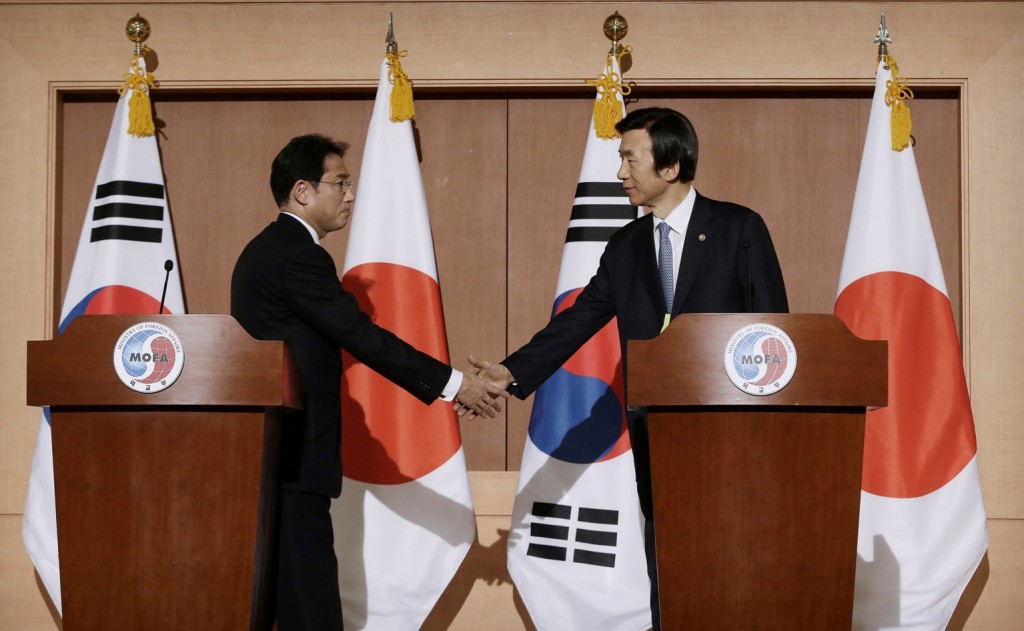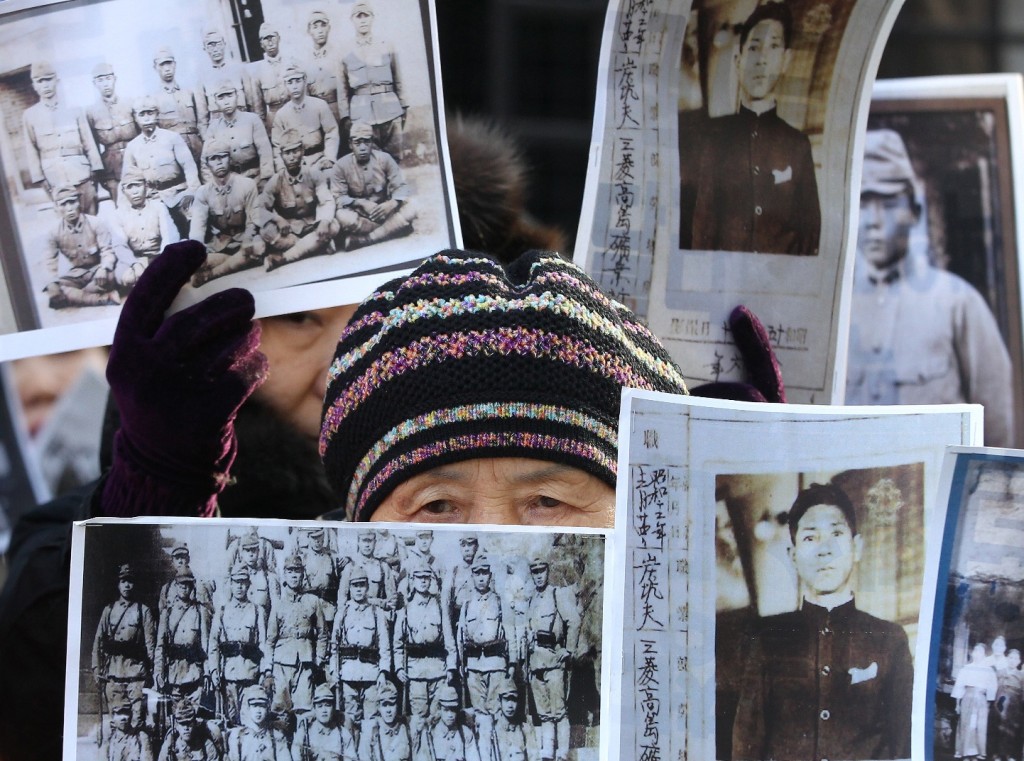- California Assembly OKs highest minimum wage in nation
- S. Korea unveils first graphic cigarette warnings
- US joins with South Korea, Japan in bid to deter North Korea
- LPGA golfer Chun In-gee finally back in action
- S. Korea won’t be top seed in final World Cup qualification round
- US men’s soccer misses 2nd straight Olympics
- US back on track in qualifying with 4-0 win over Guatemala
- High-intensity workout injuries spawn cottage industry
- CDC expands range of Zika mosquitoes into parts of Northeast
- Who knew? ‘The Walking Dead’ is helping families connect
South Korea, Japan settle deal on wartime Korean sex slaves
The deal, which included an apology from Japanese Prime Minister Shinzo Abe and a 1 billion yen ($8.3 million) aid fund from Tokyo for the elderly former sex slaves, could reverse decades of animosity and mistrust between the thriving democracies, trade partners and staunch U.S. allies.

South Korean Foreign Minister Yun Byung-se, right, shakes hands with his Japanese counterpart Fumio Kishida after their joint press conference at Foreign Ministry in Seoul, South Korea, Monday, Dec. 28, 2015. The foreign ministers said they had reached a deal meant to resolve a decades-long impasse over Korean women forced into Japanese military-run brothels during World War II, a potentially dramatic breakthrough between the Northeast Asian neighbors and rivals. (AP Photo/Ahn Young-joon)
SEOUL, South Korea (AP) — The foreign ministers of South Korea and Japan on Monday reached a deal meant to resolve a decades-long impasse over Korean women forced into Japanese military-run brothels during World War II, an important breakthrough for the Northeast Asian powers.
The deal, which included an apology from Japanese Prime Minister Shinzo Abe and a 1 billion yen ($8.3 million) aid fund from Tokyo for the elderly former sex slaves, could reverse decades of animosity and mistrust between the thriving democracies, trade partners and staunch U.S. allies.
“This marks the beginning of a new era of Japan-South Korea ties,” Japanese Foreign Minister Fumio Kishida told reporters at a news conference. Abe, he said, apologizes “from his heart” to the women for their pain and for “scars that are difficult to heal physically and mentally.”
The issue of former Korean sex slaves, euphemistically known as “comfort women,” has been the biggest recent source of friction between Seoul and Tokyo, especially since the hawkish Abe’s 2012 inauguration.
Japan appeared emboldened to make the overture after the first formal leaders’ meeting between the neighbors in 3 ½ years, in November, and after South Korean courts recently acquitted a Japanese reporter charged with defaming South Korea’s president and refused to review a complaint by a South Korean seeking individual compensation for Japan’s forceful mobilization of workers during colonial days.
Many South Koreans feel lingering bitterness over Japan’s brutal colonial occupation of the Korean Peninsula from 1910-1945. But South Korean officials have also faced calls to improve ties with Japan, the world’s No. 3 economy and a regional powerhouse, not least from U.S. officials eager for a strong united front against a rising China and North Korea’s pursuit of nuclear-armed missiles that could target the American mainland.

A South Korean bereaved family member of victims of World War II attends a rally demanding full compensation and apology from Japanese government in front of Foreign Ministry in Seoul, South Korea, Monday, Dec. 28, 2015. The foreign ministers of South Korea and Japan will meet Monday to try to resolve a decades-long impasse over Korean women forced into Japanese military-run brothels during World War II. (AP Photo/Ahn Young-joon)
South Korean Foreign Minister Yun Byung-se said at a news conference that Seoul considers the agreement “final and irreversible,” as long as Japan faithfully follows through with its promises.
Seoul, meanwhile, will refrain from criticizing Japan over the issue, and will talk with “relevant organizations” — a reference to civic groups representing the former sex slaves — to try to resolve Japan’s grievance with a statue of a girl representing victims of Japanese sexual slavery that sits in front of the Japanese Embassy in downtown Seoul. Yun said South Korea recognizes Japan’s worries about security over the statue, where anti-Tokyo protests take place weekly.
Abe plans to call South Korean President Park Geun-hye later Monday to discuss the deal, Park’s office said.
There has long been resistance in South Korea to past Japanese apologies because many here wanted Japan to acknowledge that it has a legal responsibility for the women. Japan had long argued that the issue was settled by a 1965 treaty that restored diplomatic ties and was accompanied by more than $800 million in economic aid and loans from Tokyo to Seoul.
Kishida said the comfort women system “deeply hurt the honor and dignity of many women under the involvement of the Japanese military at the time, and Japan strongly feels responsibility.”
Historians say tens of thousands of women from around Asia, many of them Korean, were sent to front-line military brothels to provide sex to Japanese soldiers. In South Korea, 46 such women are still alive, mostly in their late 80s or early 90s.
Better relations between South Korea and Japan are a priority for Washington. The two countries together host about 80,000 U.S. troops and are members of now-stalled regional talks aimed at ending North Korea’s nuclear ambitions in return for aid.
___
Mari Yamaguchi in Tokyo contributed to this story.















